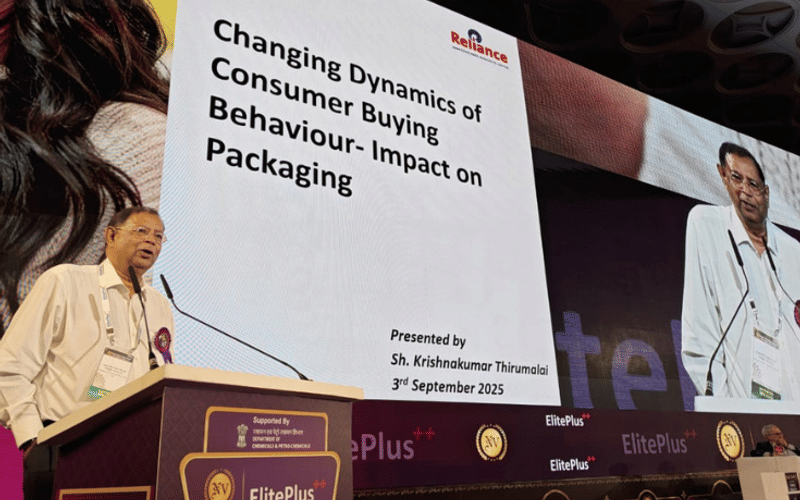Growth with sustainability: Reliance’s Thirumalai calls for affordable and sustainable packaging
As the keynote speaker at the 12th Speciality Films and Flexible Packaging Summit, Krishnakumar Thirumalai highlighted that packaging is no longer just about function, it is about addressing some of the world’s most urgent challenges.
08 Sep 2025 | By Sai Deepthi
Krishnakumar Thirumalai, director of Reliance Consumer Products, delivered the keynote on Day One of the 12th Speciality Films and Flexible Packaging Summit. Speaking on the changing dynamics of consumer behaviour and its impact on packaging, he underlined the urgent need to balance sustainability with affordability.
“From the early days of cellophane and paper to the widespread adoption of plastics, the industry has continuously evolved to meet the demands of safety, shelf life, and merchandising. But today, the conversation is shifting,” Thirumalai said, setting the tone for his address.
Thirumalai identified climate change as the most visible global challenge, calling on the packaging sector to reduce carbon footprints and prevent plastic leakage into the environment. But he also highlighted what he sees as the bigger, often overlooked issue: affordability.
“Many FMCG giants, with their long histories, are focused on financial growth and shareholder expectations. But for Reliance, a relatively new player in the FMCG space, affordability stands alongside sustainability as a priority,” he noted.
According to him, one-third of the world still craves affordable products of global quality, a need that remains largely unmet. Reliance, he said, aims to address this gap by ensuring global standards are not out of reach for cost-sensitive consumers.
Thirumalai pointed to another trend reshaping packaging: the shift from mass production to customisation. The era of massive plants churning out thousands of identical units per minute is giving way to more flexible systems. Consumers today demand variety, and manufacturers must adapt. Linked to this is the rise of “right packs” over “big packs.” While smaller, right-sized formats improve convenience and accessibility, they can also increase material usage, presenting a new paradox for the industry.
True progress, Thirumalai argued, lies in developing biodegradable packaging that can naturally reintegrate into the environment. Plastics remain affordable and effective, but their environmental impact is undeniable. He urged the industry to accelerate the scaling of sustainable alternatives to strike the right balance between practicality and responsibility.
He repeatedly circled back to the theme of affordability. Thirumalai cautioned that making sustainability aspirational risks excluding the very consumers who need it most. “Too often, sustainable options come at a premium, pricing out the very consumers who would benefit most,” he said.
Aspiration, he stressed, should come from the quality of the product, not from its high price or packaging. With economic headwinds challenging global prosperity, the industry cannot afford to let sustainability become elitist.
He illustrated the point with real-world examples, noting the impracticality of expecting Mumbai’s daily commuters to carry metal containers or asking people to pay extra for water in sustainable packaging. For solutions to succeed, they must be accessible, affordable, and comfortable for everyday use.
Concluding his keynote, Thirumalai posed a challenge to industry leaders: to innovate packaging solutions that are not only sustainable but also affordable. He emphasised Reliance’s willingness to act as an extended research partner in this journey, collaborating with global players to find scalable answers.
“The future lies in making sustainability affordable and accessible, not aspirational for only a few,” he said, urging the industry to align innovation with inclusivity.


